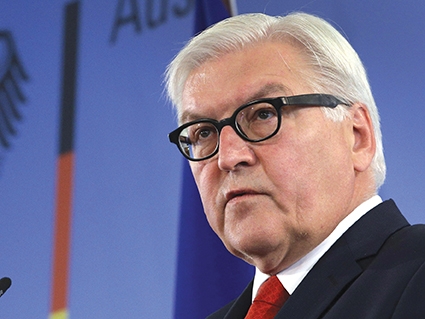Easing Sanctions against Russia for the Sake of EU Unity
At a recent business forum held in Germany, the country’s Vice-Chancellor Sigmar Gabriel called for an end to the EU’s sanctions against Russia and a return to direct negotiations with Moscow.
Gabriel was quoted as saying that Moscow is a reliable partner for Europe and demanded a gradual lifting of sanctions. Gabriel is known as one of Germany’s most stridently pro-Russian politicians who publicly disagreed with Chancellor Angela Merkel’s decision to impose sanctions on Moscow for its illegal annexation of Ukraine’s Crimea Peninsula as well as its invasion and support for separatists in Ukraine’s eastern Donbass Region.
The most recent call for an end to the on going sanctions is only the latest ins a series of demands by Gabriel to ease pressure on Russia. He has repeatedly clashed with Merkel over her insistence that Russia remain suspended from the G7 format until Moscow fully adheres to a signed peace accord, known as Minsk II, that aims to find a peaceful political solution to the war in Ukraine.
Some German officials, including Foreign Minister Frank-Walter Steinmeier, have called for an easing of the two-year-old round of sanctions once Russia makes a substantive effort to adhere to the Minsk format.
“If Russia begins to implement the Minsk agreements fully and tangible progress is made, we can begin to discuss an easing of the sanctions,” Steinmeier was recently quoted as saying.
Steinmeier also supports the idea of returning to the G8 format, with Russia reinstated as a participating member, though Merkel has ruled out any possibility of a Russian return until the Kremlin lives up to its promise to help settle a host of issues in the post-Soviet space.
Steinmeier has been quick to note that resistance to the sanctions is growing in Greece, Slovakia, Hungary and Italy – countries with long-established economic ties to Russia and who have endured significant economic losses in the last two years.
Steinmeier has also said that maintaining unity amongst the EU’s 28 members is becoming increasingly harder with each passing month as economic growth in Europe remains static and lucrative market in Russia remains closed to the world’s largest trading bloc. As a result, Steinmeier has warned that an extension of the sanctions, due in July, may not be a forgone conclusion.
Italian Prime Minister Matteo Renzi has recently called for a debate over the sanctions’ effectiveness before an extension is implemented.
In early June, France’s National Assembly voted for a non-binding resolution that called for a lifting of the sanctions, saying they negatively affect French farmers due to trade restrictions.
Those who oppose a lifting of the sanctions warn that backtracking on their stated goal would set a dangerous precedent for future situations.
“The sanctions can only be lifted after all of the conditions that Moscow agreed to are fulfilled as stated by the agreement. If you alter the provisions of Minsk, before their full implementation, would set a dangerous precedent and be a sign of weakness,” said the US’ ambassador to Germany, John Emerson.
Taking the pressure off Moscow has grown far more complicated in the last two years, as the Kremlin has opted to try and exert both its hard and soft power on the international stage.
Russia’s questionable role in the five-year-old Syrian Civil War has further complicated matters. Nine months into its campaign to prop up the Bashar al-Assad regime – Moscow’s closest ally in the Middle East – the war continues to grind on with no end in sight.
Though the Kremlin would be reluctant to admit that it needs the assistance of Europe and the United States in finding a lasting and favorable resolution in Syria, Moscow will not be able to do so under the current confrontational climate with the West.
Opponents of the sanctions also say that the West cannot afford to maintain pressure on Russia if it hopes to find an end to the turmoil in the Middle East.
The Baltic States and Poland remain the strongest proponents of maintaining the sanctions. Their position along Russia’s borders and, in the case of the Baltics, demographic issues that include large numbers of ethnic Russians within their borders make them the most susceptible to Moscow’s recent revanchist policies, as seen in Ukraine.
The possibility of a compromise between the pro- and anti-sanction camps remains if NATO agrees to permanently station large numbers of defensive troops in the Baltics and parts of Eastern Europe.
Dimitri Dolaberidze












